Back and forth conversation about the Florida Market
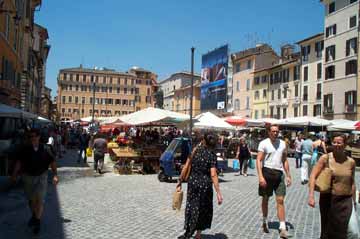 Dijon Market, France, in the midst of extant "historic" buildings. Photo from Toto Tours.
Dijon Market, France, in the midst of extant "historic" buildings. Photo from Toto Tours.Colleague: What do you think about the lofts? And yeah, I saw the phased building language. I also saw that the legislation allows the historical preservation stuff to be waived if the developer and the Office of Planning find it impractical.
Me: Well, we still have the option of filing a historic designation application. That would throw a monkey wrench into things... Even so, a project of special merit could be proposed that would allow for "waiving" historic preservation provisions, but it's quite difficult. A lot harder than during the Barry years when so many important buildings were torn down.
For example, back then, one great old firehouse located downtown was deconstructed and given to DHCD for "safekeeping." DHCD threw the building pieces in the trash. Prophetic.
Plus, this provision communicates how authenticity and history and historicity is seen by the developers as a hindrance, as nothing of value.
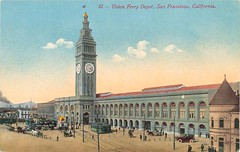
They can mention the Ferry Building or Faneuil Hall in their literature, but I don't think they really mean it. Plus Union Square in Manhattan, as cool as it is, is being taken over by chains, at least in the commercial buildings, while the publicly owned square is the major place that accommodates independent businesses, with the Greenmarket (farmers market) and Holiday Market during the holidays.
Plus, Faneuil Hall has had problems over the years, just like the Inner Harbor Marketplace, which now has very little commerce that has its roots in either Baltimore or Maryland. That's one of the problems with new construction and management by developers--there are many ways and methods that end up discouraging independent businesses.
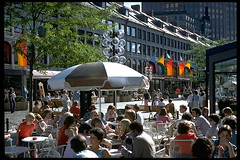 Outside Faneuil Hall, Kidder Smith Images Project, MIT.
Outside Faneuil Hall, Kidder Smith Images Project, MIT.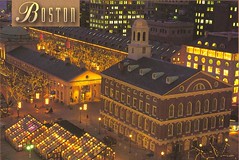 Faneuil Hall photo by Tony Silviera.
Faneuil Hall photo by Tony Silviera.But it's tough. Adding housing in an area convenient to the subway is something that is generally considered good public policy. Adding housing in an industrial area could well create a constituency complaining about the congestion, noise, trucks, etc., present in a business district.
Colleague: We should check to see if crime is decreasing in the area (I think it is), rather than increasing as the legislation claims.
Me: Declarations of "blight" and "crime" are necessary to meet the legal tests that justify government condemnation of land, which is governed by interpretation of the Fifth Amendment of the Constitution. But it's still all relative and subject to gaming.
Colleague: Eminent domain is stilll a huge demand. Why don't people get a little more upset about the property rights issue here? I also noticed that they have some enviromental language, but nothing too concrete, and that the community amenities [will be provided only] if the District deems them necessary.
Me: Because they see this as old-time white property owners who once had businesses in the market but don't anymore, and who now live in the suburbs, screwing over the city. It's quite a racist argument.
And they seem to imply that the businesses and customers that the New Town proposal intends to displace (even though claims are made that the businesses will be retained, and in fairness, it is possible, although very expensive, for them to do so) are less worthy than the new businesses they intend to create.
If you read back to old urban renewal plans, there was great language justifying the benefits in most places in the United States too and the reality is much much less. In fact, you can read the H Street Urban Renewal Plan and it reads great! But the reality was a couple office buildings leased to the government, some garden apartments, two senior housing towers, a strip shopping center, and a downscale mall (Hechinger Mall).
 Delta Towers on the 1400 block of Florida Avenue NE is one of the projects that resulted from the H Street Urban Renewal plan.
Delta Towers on the 1400 block of Florida Avenue NE is one of the projects that resulted from the H Street Urban Renewal plan.The plan saw the extant commercial district as obsolete due to suburbanization and automobility supplanting pedestrian-oriented commercial districts. The plan brought this about by removing the supermarkets, post office, and other destination retail from H Street NE and placed it into the Hechinger Mall. To reach Hechinger Mall, many people drive, and over time chain businesses have almost fully replaced independent businesses.
Reality and history have a way of bringing the high faluting language down to earth.
Colleague: I get at least as upset about the absentee landowner who let's his house become an eyesore, or the suburb-dwelling landlord who doesn't care that his tenants are selling drugs and waiving around guns, but the properties in the Florida Market have businesses in them and there are very few vacancies.
Can't people see that this is more like working with existing business owners on H Street (the occupied buildings, not the long-boarded up ones where the owners are looking for $1 million to sell)?
Me: This is a really good point. Working with existing property owners and business proprietors is hard. They are independent entrepreneurs for a reason--they don't necessarily play well with others! Plus, you want them to spend most of their time making their businesses great, and they tend to not have the skills necessary to market their businesses and create an identity for their commercial district. (That's why the development of a merchants association is a good thing--as long as merchants aren't in charge of developing and marketing the overall identity!)
In the Florida Market people begin work very early, at 2 or 3 in the morning. And they stay in their businesses all day. So they don't even know many of the other business proprietors. It makes it hard for them to work together.
Colleague: I guess the fact that most people don't see the market everyday makes it pretty easy for them to believe anything someone tells them about it. Out of sight, out of mind.
The scary thing is that I've had people tell me that they think the city should just bulldoze the area and put in a Barnes and Noble and Linens and Things. They don't care about the market, or the landowners, or the workers.
Me: You mentioned this to me in the summer. That's helped drive some of my writing about how we keep developing new retail spaces without strengthening the spaces we already have. And we keep adding more and more retail space, while extant places, including most neighborhood commercial districts in the northeast quadrant for sure, but many in SE and certain parts of NW continue to languish.
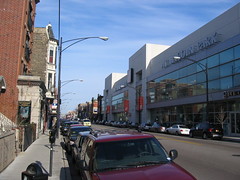 This Home Depot store in Lincoln Park in Chicago was built within an extant commercial district, paying respect to the building form there, and strengthened the commercial district instead of creating another competing commercial district. Photo by Steve Pinkus. (And no, I don't like the facade.)
This Home Depot store in Lincoln Park in Chicago was built within an extant commercial district, paying respect to the building form there, and strengthened the commercial district instead of creating another competing commercial district. Photo by Steve Pinkus. (And no, I don't like the facade.)Look at the two office buildings on H Street or the block across the street, or even the H Street connection, and you can see how some larger format retail can be inserted into the urban fabric in a manner that will strengthen and improve the H Street commercial district rather than create more places that compete with our extant commercial districts.
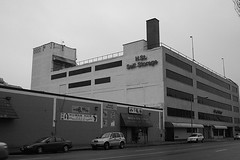 H Street Self Storage. Image from Frozen Tropics.
H Street Self Storage. Image from Frozen Tropics.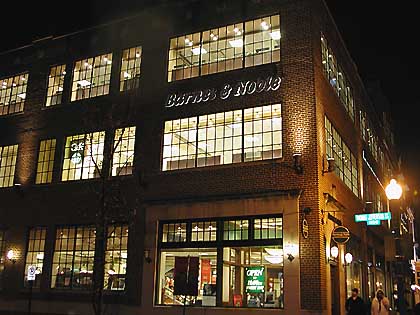 Image of the Georgetown DC Barnes & Noble by Henryk Broder.
Image of the Georgetown DC Barnes & Noble by Henryk Broder.As far as the Florida Market goes there are tremendous opportunities:
1. There is an effort to create an H Street Community Market co-operative. Why not try to locate it in the Florida market? There needs to be an organic option.
2. People are talking about trying to get Trader Joe's to open more stores in the city (although the reason they finally said yes to Foggy Bottom is that the Foggy Bottom Association gave TJ's $1.2 million--which they received from their settlement with the developer for agreeing to the cancellation of an easement the Association held on the property).
Trader Joe's located in the Florida Market area would strengthen the food district aspects tremendously.
3. Firehook wanted to relocate its bakery to DC. The Florida Market area would have been a natural. And not just that kind of bakery. What about others, including tortilla production? There are a couple pasta/noodle manufacturers in their now...
4. The Office of Planning study recommended:
-- a public space suitable for festivals;
-- community education facilities. In the past, I've mentioned examples from the River Market in Little Rock and La Boqueria (Barcelona) and I also suggest that DC's Office of Aging and Food and Nutrition programs (WIC, etc.) could teach classes in such a facility as well
-- a shared commercial kitchen for small businesses that would satisfy Department of Health standards for food production, comparable to the facility in Athens Ohio (and I guess there is one in Greenbelt too).
-- the possibility of incorporating culinary training programs. I.e., what about having a DCPS hospitality vocational program operating in the Florida Market district, with a restaurant open to the public?
5. I mentioned the possibility of attracting Amish food producers that will be displaced when the site of the Amish Market in Burtonsville, Maryland is redeveloped.
-------------
The reality is that without a much different process, the likelihood of such uses developing in the Florida Market District under the "vision" of people like John Ray is infinitesimal.
Without a strong strong public process AND REQUIREMENTS IN THE CONTRACT, developers tend to end up doing things a lot more like the Inner Harbor than the Reading Terminal Market (Philadelphia).
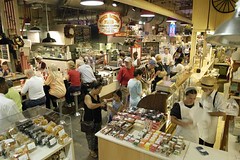
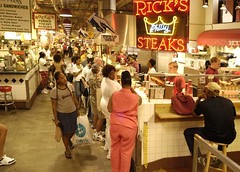 Images of the Reading Terminal Market from the Project for Public Spaces, from the website section on Great Public Spaces.
Images of the Reading Terminal Market from the Project for Public Spaces, from the website section on Great Public Spaces.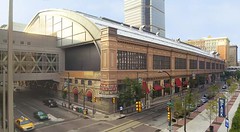 Reading Terminal Market, exterior.
Reading Terminal Market, exterior.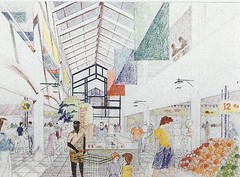 Rendering of interior of market building, New Town proposal.
Rendering of interior of market building, New Town proposal.This contract is written by and for the developers, not the city and its residents.
And their architectural sensibility is derived from suburban office parks and developments, and commercial supermarkets!
 AP photo by Ben Margot.
AP photo by Ben Margot.Index Keywords: urban-revitalization



1 Comments:
Great information. This works great for me. Thanks for sharing this.
Wow, what an amazing information!! Thanks so much.
Post a Comment
<< Home